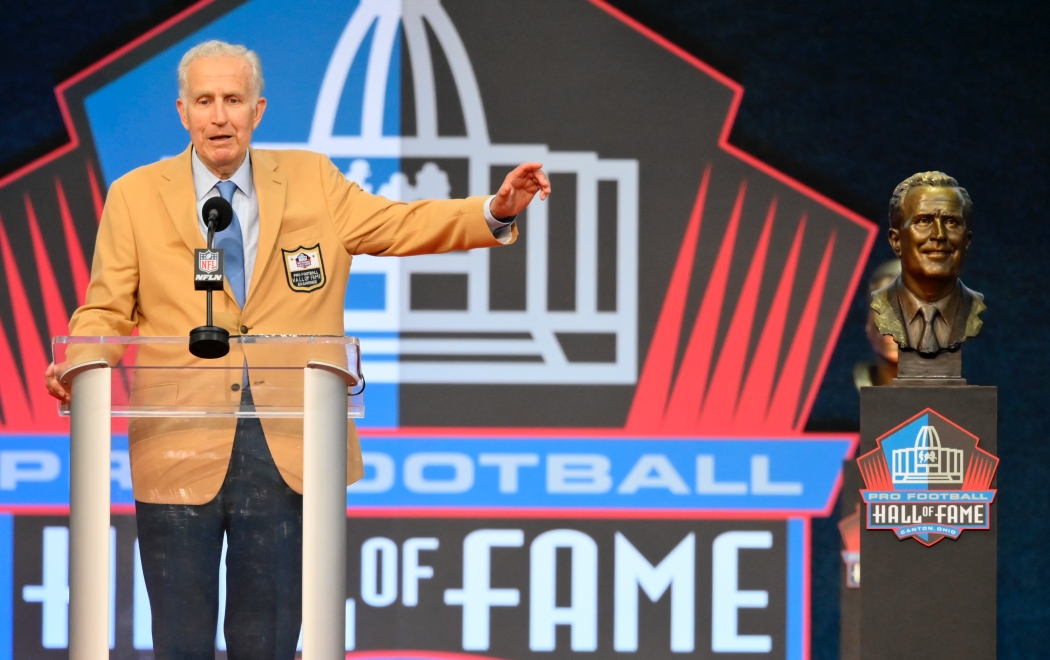Gold Jacket Spotlight: Thank Paul Tagliabue For Competitive Balance

When the National Football League opens its 102nd season this week in Tampa, fans, players, coaches, staffs and owners of all 32 teams will believe to their core they can compete for the Vince Lombardi Trophy that will be presented at SoFi Stadium next February.
Even the eight NFL teams that finished in last place in their respective divisions in 2020 envision playing in 2021’s postseason.
And why not?
Since divisional realignment – establishing eight divisions of four teams each – only twice (2014 and 2019) has a season concluded without at least one team accomplishing a “worst to first” transformation. Last year, the Washington Football Team became the 26th team since 2002 to pull off the feat.
If the Bengals, Broncos, Eagles, Falcons, 49ers, Jaguars, Jets or Lions make that jump this fall, they should acknowledge one of the newer members of the Pro Football Hall of Fame: former NFL Commissioner Paul Tagliabue, who this week steps into the Gold Jacket Spotlight.
In his Enshrinement speech four weeks ago as a member of the Centennial Class of 2020, Paul called the NFL’s financial structure “the sanest economic system in big‑time sports.”
With a landmark collective bargaining agreement in 1993, Paul helped create a more cooperative labor-management culture that endures today.
“It included free agency for the players. It tied a salary cap to a percentage of growing revenue. It required all clubs to spend above a salary floor,” he said.
The combination of unrestricted free agency, a salary cap and a salary floor created parity in the NFL that has meant not only could any team win on “any given Sunday,” but also that they could rise from a four- or five-win team to a nine- or 10-win team in a single offseason.
An NFL-record three teams made the worst-to-first leap in both 2005 and 2006. The 2009 New Orleans Saints and the 2017 Philadelphia Eagles won the Super Bowl after finishing in last place in their division the previous seasons.
Such competitive balance – far more prevalent in the NFL than any other major sports league – serves as a legacy for one of the mantras that guided Paul’s tenure as commissioner.
“When I succeeded (Pete Rozelle) in 1989, I knew I wanted to maintain his fundamental principle: ‘Think league first.’ Those were the three words he said so often. Think league first,” he said at his Enshrinement.
Shortly before his election as the NFL’s seventh commissioner, Paul addressed media covering the impending vote and transition.
“George Halas said the critical thing to recognize is that the NFL is like a wagon wheel with a rim and 28 spokes, and the wheel would only roll if the rim and spokes were strong,” he said, according to a report from the Chicago Tribune.
“The rim represented the draft, network TV, equal sharing of revenue – all the league institutions he felt were critical. All 28 spokes, or teams, had to be equal, one as strong as the other. None could be shorter, longer, fatter or thicker. And they had to receive equal treatment within the rim. Mr. Halas said it about as well as I could say it.”
Today those spokes number 32, and this week each one represents a team filled with the belief it can reach Super Bowl LVI. Their journey begins this week.
Grambling State Tops Tennessee State in BCFHOF Classic
Grambling State with a 16-10 victory over Tennessee State.
2021 BCFHOF Classic: Fan Guide
Access our BCFHOF Classic Fan Guide to help answer your questions.

